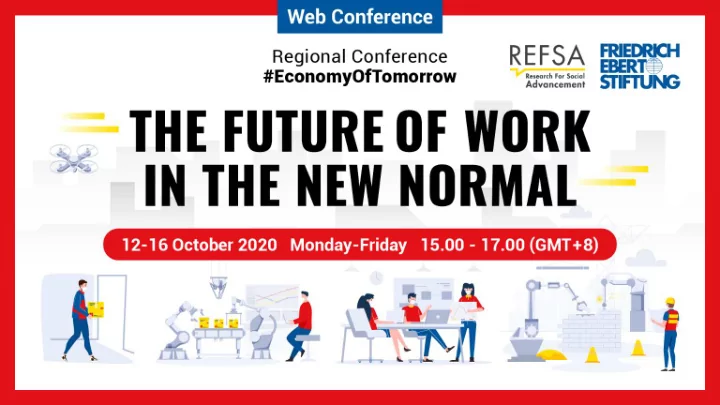

Session 4: The Youth Perspective Overview - Lee Hwok Aun (Youth in Malaysia) • Prevailing issues in the labor market with youth in Malaysia revolves around supply-demand mismatch: increasing graduation rate but decreasing job openings - demands analysis • Another undisputed trend is increase in “self - employment” - comes with a whole host of issues; apart from lack of social protection, precariousness of job, but also lack of skill building and training • Malaysia need to move out of low wage/low skill labor intensive - not yet seen but careful of overemphasis on e-commerce, crafts and manufacturing cannot be ignored
Session 4: The Youth Perspective Overview - Bhima Yudistra (Youth in Indonesia) • Prevailing issues in the labor market with youth in Malaysia revolves around high youth unemployment: rates are high at almost 16% only lower than the likes of Iraq and Egypt, and female unemployment rate of more than 16% • Interestingly, the Government is planning on a reversal of labor policy, back to 1980’s -style low-skilled worker sector jobs creation by attracting FDI • Indonesia still has the demographic bonus of very high youth population yet the purported Indonesian “digital boom” is not trickling down in an equal fashion between youths in advantaged and disadvantaged positions
Session 4: The Youth Perspective Overview - Pham Thi Thu Lan (Youth in Vietnam) • Very similar situation with Malaysia and Indonesia: Precarious job arrangements for youth which implicates low wages, lack of social security, and dangerous working conditions during COVID-19 (food delivery etc) • The more likely transition is from “non - standard” employment to UNemployment, rather than interim arrangement en route to employment • Education sector not ready to prepare youth to enter job market needed for Work 4.0; as a result overqualified youth work in low-skill jobs • Unlike MYS and IDR, Vietnamese youth in gig employment are much less organized
Session 4: The Youth Perspective Self employment and the new “gig” economy • Gig economy is good for a while, but development of skills and protection are imperatives in the longer term • In Malaysia, access to tech-based entrepreneurship has equity paradoxes: most 40% of those who started up business are from family, 25% own savings, 20% commercial sources • Similarly, Indonesia has the world’s 5th largest start -up population with 2,203 start-ups but local talent simply cannot compete with expats being brought in under new Omnibus law
Session 4: The Youth Perspective Wages • In Malaysia, as low as RM1,580 (~USD380) median wage for 20 to 24 year olds in Malaysia and also slowest wage growth rate; in fact, more than 85% of graduates who work in self-employment earn less than RM2,000 (~USD480) • Indonesians have to overwork to survive: 26.3% of workers in Indonesia worked 49+ hours a week, where Indonesia is internationally ranked #3 in Hard Labour population. Vietnamese youth also face among lowest wages. • Governments need to take the “high road” towards high income, high skilled, coupled with work life balance - quit the race to bottom, women most affected (Indonesia)
Session 4: The Youth Perspective Recommendations • Need for new mindset or ethos on the concept of WORK - fundamental questions need to be probed: What are the role of jobs? Livelihood, dignity, equality, productivity, decent work, work-life balance • Dual-pronged plan: mobilization of R&D support for the high-skilled labor and graduates, with “link -and- match” schemes for youth with low qualifications and semi skilled youth to find jobs or market their products • Greater collective action among youth in Vietnam, with international commitment to regulate employment and labor laws
Recommend
More recommend